
Lot 257
![[Insane 17th-century annotator]](https://media.app.artisio.co/media/104cbde6-0d38-43cb-9e0f-bb721ef57bcf/inventory/96b7add7-4f15-446b-9f07-53efbb314fa3/becd10d9-2eb3-41d7-ae14-499951e083c8/0001_EdDCFh_original.jpg)
[Insane 17th-century annotator]
The Most Notable Antiqui[ty] of Great Britai[n], vulgarly called Stone-Hen[g]
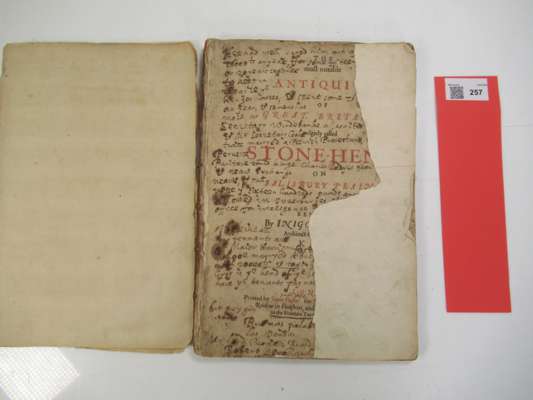
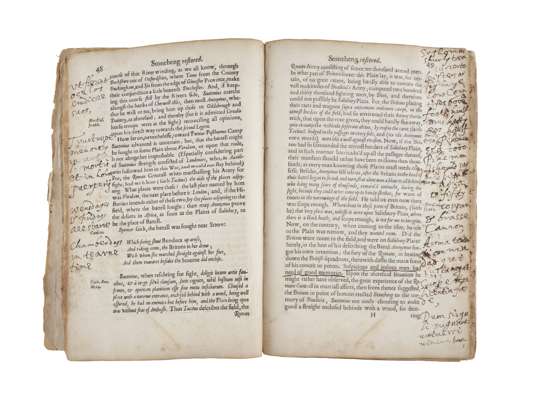
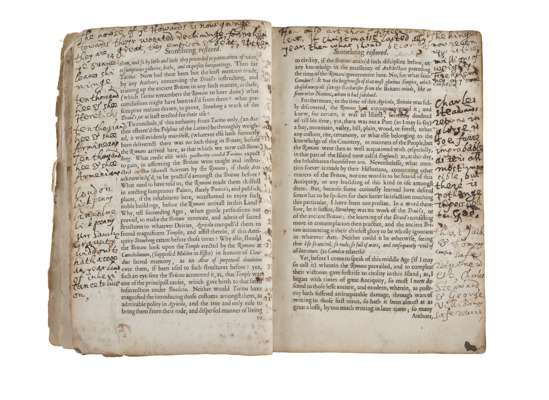
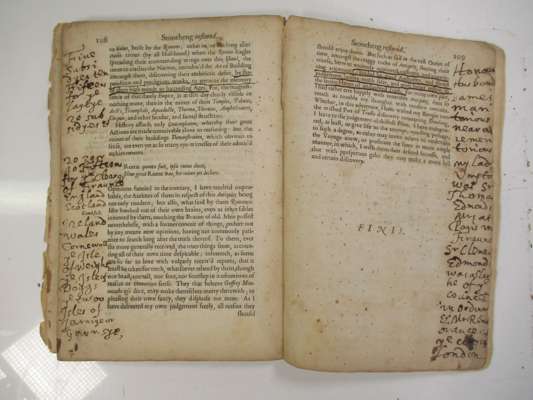
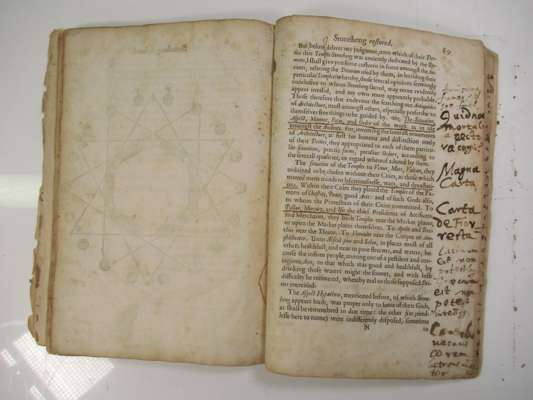
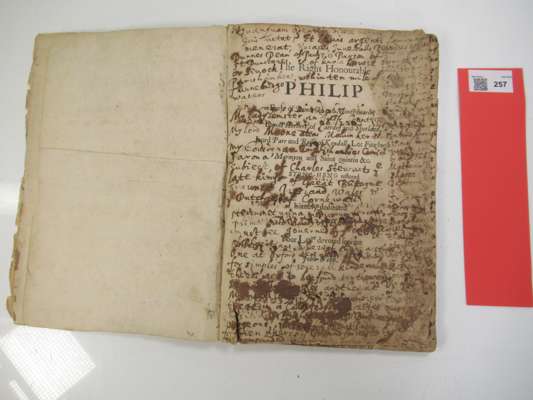
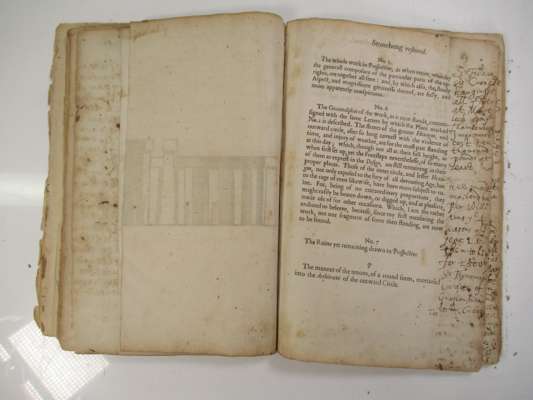
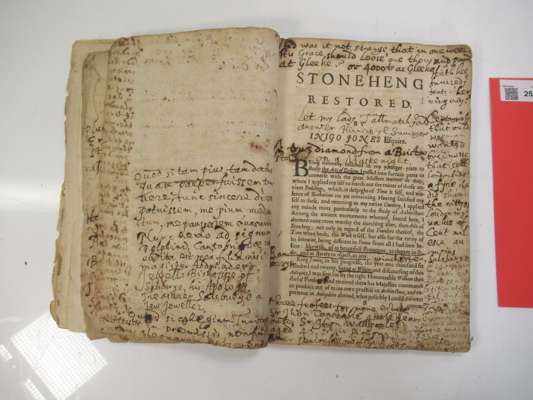
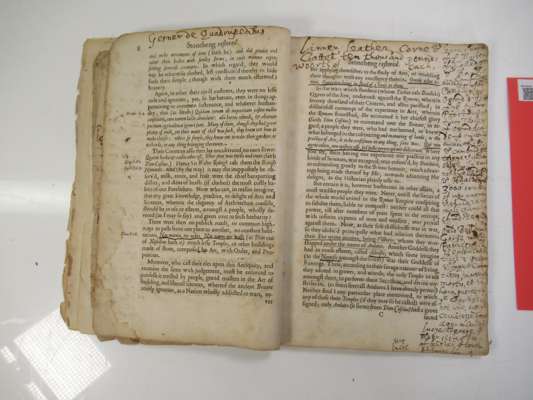
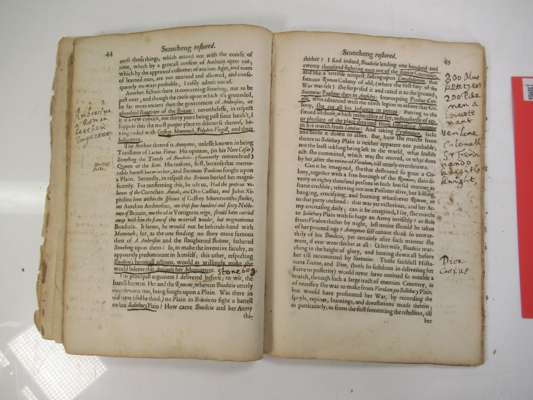
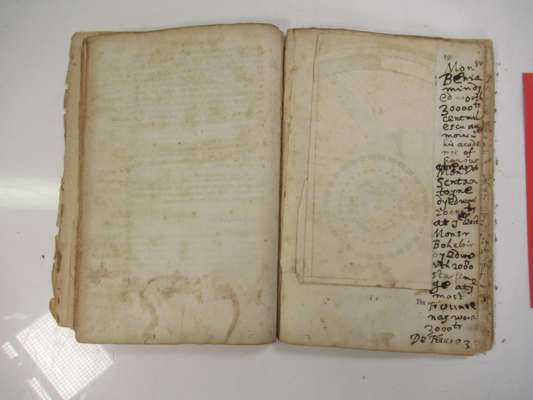
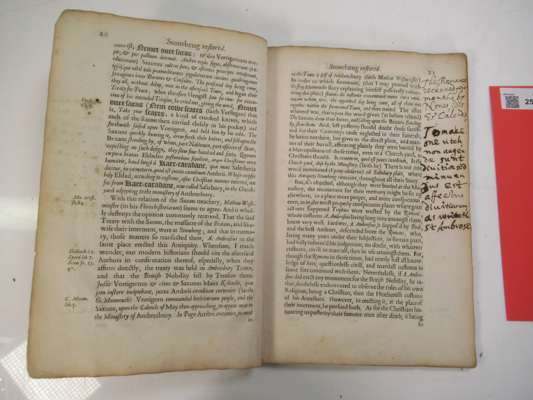














Rare Books, Manuscripts, Maps & Photographs
Auction: 13 July 2022 from 10:00 BST
Description
on Salisbury Plain. Restored by Inigo [Jones]. London: printed by James Flesher, [1655]. First edition, folio (27.7 x 18.2cm), disbound, lacking E2, portrait frontispiece and 4 folding woodcut plates (of 7; the remaining plates with old repairs), with 3 initial blanks (all detached), title-page defective, browning, damp-staining towards front. With profuse ink marginalia throughout in a contemporary hand (closely trimmed in places; occasional concomitant paper corrosion), in English and occasionally Latin (and a few phrases in French), unrelated or only tangential to the printed text, in a rambling, scurrilous and repetitive style, with numerous references to 17th-century figures and events, and exhibiting a fixation with large sums of money, the printed dedication 'To the Favourers of Antiquity' (A4) signed 'Pembroke & Muntgomrye' in the same hand as the marginalia, the signature asterisked with an accompanying annotation by an 18th-century hand, 'This Philip E. of Pembroke and Mongomery [sic], was the writer of these wild notes. A Wood woud have less belyed him, in calling him a mad man, than in saying he was illiterate & coud not write his name', 19th-century annotation to initial blank, 'There is reason to believe that the notes scrawled upon these pages are written by the Philip Earl of Pembroke & Montgomery to whom the book is dedicated, E. D.'
Footnote
Note: The dedicatee of the work was Philip Herbert, fifth earl of Pembroke (1621-1669), though the 'writer of these wild notes' is more likely to have been his son, the infamous seventh earl (1653-1683), also Philip, who succeeded in 1674 and 'quickly acquired an unenviable reputation for barbarous and violent behaviour' (ODNB). He was reported by John Aubrey in Brief Lives (1680) to keep at the family seat of Wilton House a menagerie of exotic animals, was committed to the Tower for blasphemy, and killed two men in separate drunken incidents, escaping punishment first through claiming privilege of peerage, and second by royal pardon.
The character who emerges from these annotations is obsessed with money, and those who have it, motifs which recur throughout a bewildering variety of ravings, doggerel verse and arbitrary lists, written in spelling eccentric even for the period, altogether suggesting a person of entirely unsound mind. If he was not the earl of Pembroke, references to Wilton House and Ramsbury suggest that he at least thought he was, and the annotations are perhaps dateable to the 1660s on the basis of a recollection that 'some 40 or rather 44 years agoe, there was a great faction betwixt ye Digberians & ye Buckingamians' (p. 26); another remark, 'How ould art thou? fifteen come Lent. If Christmasse lasted all ye year, then what should become of Lent' (p. 15), suggests that the annotator was an exact contemporary of the seventh earl's.
Further examples include:
'If hee be mad as my Lady Harewood says whose tongue is not slaunder it is rather for wantinge ye ten thousand pounds an year his father promisd to give him tha[n] yt hee thinkes 6000 an year to bee too mutch for him to manage with Wilton & Ramesberye' (p. [vi]);
'And was it not strange, that in one week His Grace should loose one thousand pounds at gleeke? or 4000 ls at gleeke. Hath hee burned ye teats of her virginity? Certayneley that ould woeman wanted businesse that sette London bridge afyre, shee did [?] the city of London to ye value of cent mil escu au moins' (p. 1)
'The house of ye Howards is now goinge towards theyre woonted declininge, for when they are great, they emprison & beat, & then ye sunne leaves shining then thousand hee & shee hereticks, ten thousand hee & shee Armineans, ten thousand hee & shee Armenians, London lickpenny, Lincolne lickpenny, Mrs Sarah Graunty widdow hath a 1000 an year land of inheritance to live on' (p. 14);
'Ravilliack Crummewell is to bee pulld apeices wth 4 wild horses upon London streets & then to bee hang draiwen & quartered not decapite[d]' (p. 31);
'Hinnico Jones alias Iniguity Jones a justice of peace of ye qudrum and custos rotilorum hath for keepinge ye kinges houses in repayre deaux cens mil escu per an, three score thousand ls starlinge an year and well payed hee is 4 score years ould. Midwife Mrs Bullard midwife Mrs Whiteby midwife Mrs Cutler twoo parsons widdowes' (p. 34);
'Mathew Cardroe lyeth heer, whooe drunke too mutch of bottle bear. I care noe more to kill them in bravado then forto drinke a pipe of Trinidado [...] Tom Tippett uppe & downe doth walke & cannott see himself in his owne optick glasse' (p. 41);
'Wilton House Ramsberye house Pembrokes Earl Pembrokes & Muntgomeryes then Lord Chamberlaynes. Personal suppositum intelligens ten of 20 ls an year augmentation monye to ye Greeke lecture or buildinge at Cambridge, Oxford Caius de Antiquitate Cantabrigi' (p. 43);
'I kneaw ye 3 Mackullyes taylours all three Scottshmen & brothers ye woorst of them dyed woorth twenty-thousand pounds they three dyed in all woorth three score thousand starlinge deaux cens mil escu au moins' (p. 50);
'I was nurst 2 years at Mourtleack two years togither [...] by Nurse Beck, whoe nurst ould mad Besse Tallmatch' (p. 61);
'Sr Ferauncis Cranes hanginges all ye suits at Mourtleck upon ye Thames where I was nurst cost ten thousand pounds at least. Hee made my Lord keeper Williams ye 4 seasons of ye year & sould them to him for £500 Sir Firauncis Crane of Grafton Auditour Crane' (p. 63);
'Hee & shee marquesse Ormonde, hee & shee Marquesse Toosmond, Hee & shee Marquesse Desmond, Rabshekais & Achitophells, Madam you must bee whippt at a cart stayble, or you shall ride in a dunge cart, or have rotten eggs throwne at you[r] Irish honour' (p. 69).

























